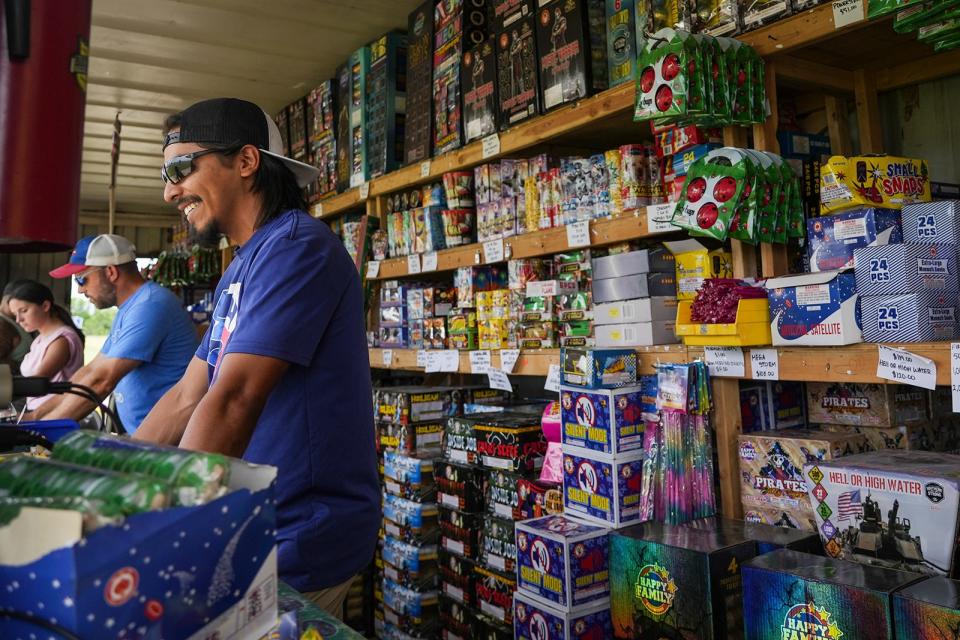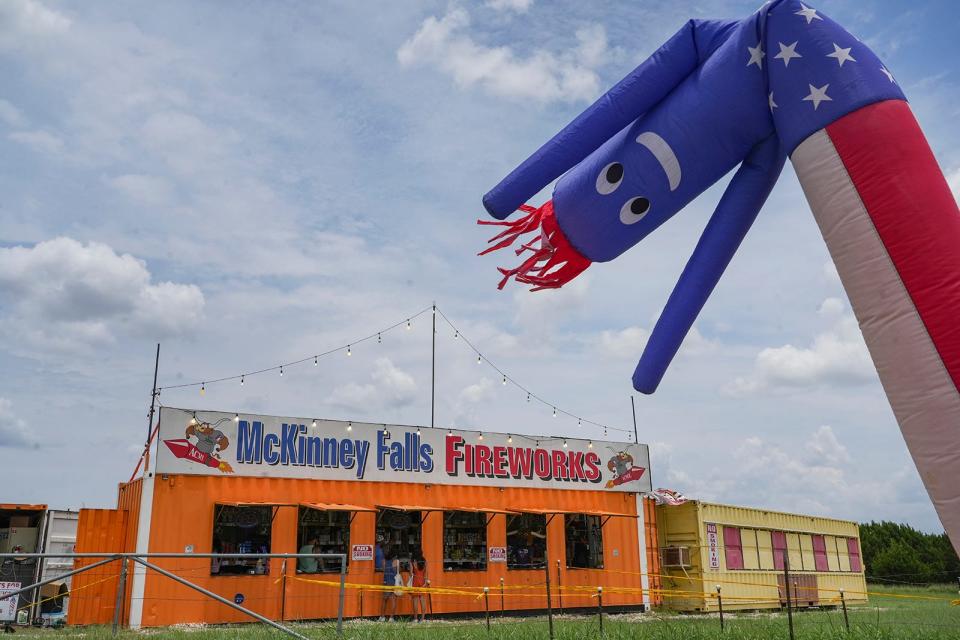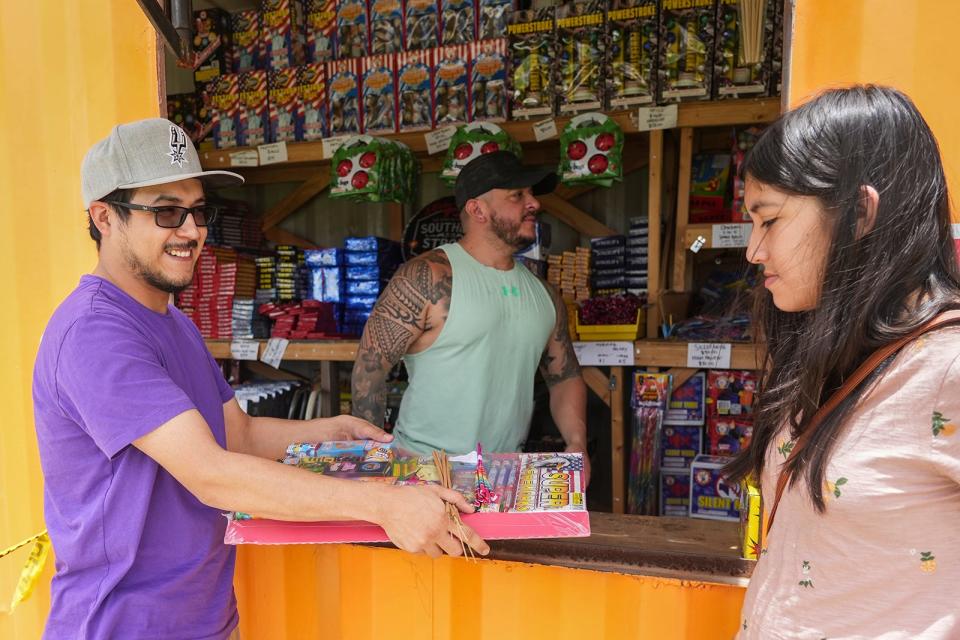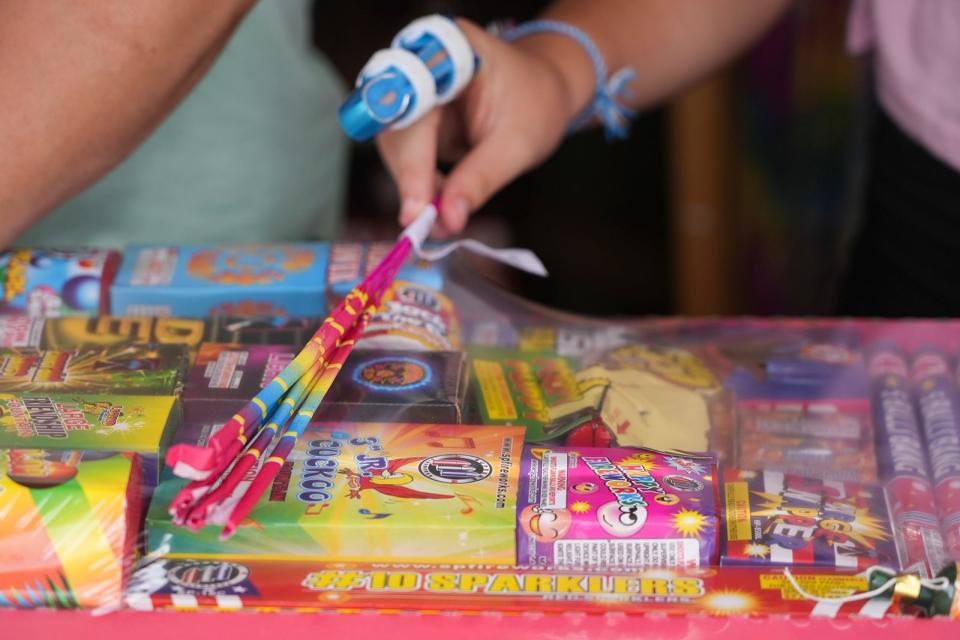With firework sales on the rise, here are 5 things to know about firework laws in Texas
With Independence Day on Tuesday, there are common threads through every American’s celebration on July 4: Hotdogs, hamburgers, apple pie, and, of course, fireworks. Once an industry that was deeply stained by the COVID-19 pandemic, firework sales have made a serious comeback, with $2.3 billion spent last year on consumer fireworks alone, according to the American Pyrotechnics Association.
Texas state law has opened up firework sales again for the holiday, from June 24 to July 4 at midnight.
In Austin, fireworks are illegal to sell and use in any circumstance without a permit, but the outskirts of the city tell a different story: stands scattered down the roads, where customers wait in the heat to get their hands on fireworks for their parties and get-togethers.
According to the APA, "consumer fireworks retailers have reported that sales will increase by approximately $100 million from 2022 as families begin to prepare for their annual Fourth of July celebrations."
More: Where can you watch Fourth of July fireworks in the Austin-area? Check out our list
Brightly colored foil and cardboard packets store an abundance of options for consumers to light up their backyard during the holiday season at places like McKinney Falls Fireworks, a short drive away from the city.
Brandon Fabela, a worker at the stand, said that an increase in sales has been noticed in comparison to last year.
"These past couple of days, we've had quite an increase in people," said Fabela. "It's been pretty good."

What items are legal in Austin?
According to the Austin Fire Department’s website, items that are allowed in the city include:
Snake, GlowWorms – Pressed pellet of pyrotechnic composition that produces large, snakelike ash upon burning. The ash expands in length as the pellet burns. These devices may not contain mercuric thiocyanate.
Smoke Device – Tube or sphere containing pyrotechnic composition that, upon ignition, produces white or colored smoke as the primary effect.
Wire Sparkler – Wire coated with pyrotechnic composition that produces a shower of sparks upon ignition. These items may not contain magnesium and must not exceed 100g of composition per item. Devices containing any chlorate or perchlorate salts may not exceed 5g of composition per item.
Trick Noisemaker – The item produces a small report intended to surprise the user. These devices include:
Party Popper – Small plastic or paper item containing not more than 16mg of explosive composition that is friction-sensitive. A string protruding from the device is pulled to ignite it, expelling paper streams and producing a small report.
Booby Trap – Small tube with string protruding from both ends, similar to a party popper in design. The ends of the string are pulled to ignite the friction-sensitive composition, producing a small report.
Snapper – Small, paper-wrapped item containing a minute quantity of explosive composition coated on small bits of sand. When dropped, the device explodes, producing a small report.
Trick Match – Kitchen or book match that has been coated with a small quantity of explosive or pyrotechnic composition. Upon ignition of the match, a small report or a shower of sparks is produced.
Cigarette Load – Small wooden peg that has been coated with a small quantity of explosive or pyrotechnic composition. Upon ignition of the match, a small report or a shower of sparks is produced.
Auto Burglar Alarm – A tube that contains pyrotechnic composition that produces a loud whistle and/or smoke when ignited. A small quantity of explosive, not exceeding 50mg, also may be used to produce a small report. A squib is used to ignite the device.
The website also states, “The City of Austin has adopted an ordinance forbidding the storage, use, and handling of fireworks within the City of Austin. The Austin Fire Department has aggressively sought compliance with this ordinance.”
Fireworks that are allowed in the state, with the exception of a majority of cities like Austin, are 1.4G fireworks. According to the APA, items “classified as 1.4G explosives are consumer fireworks intended for use by the general public."
Examples include fountains, cones and firecrackers.

What fireworks are illegal in Texas?
According to the Texas State Fire Marshal’s Office Fireworks Guide, nonpermissible fireworks in the state include:
Skyrockets or "bottle rockets" with:
A total propellant charge of less than four grams
A casing size of less than five-eighths of an inch for the outside diameter and less than 3-1/2 inches in length
An overall length, including stick, of less than 15 inches
Pop rockets with a propellant casing length of less than five inches, an exterior diameter of less than three-fourths of an inch, and an overall total rocket length of less than 26 inches.
Other fireworks determined not acceptable by the United States Consumer Product Safety Commission.

Where can fireworks be used?
State regulations, along with city and county ordinances, are the first place to look to see if fireworks are allowed. Many major cities in the state like Austin have either restricted or banned the use of fireworks for consumers.
According to the Texas Fire Marshal's Office, places fireworks cannot be used in the state include:
Within 600 feet of any church, a hospital other than a veterinary hospital, an asylum, a licensed child care center, or a public or private primary or secondary school or institution of higher education unless the person receives authorization in writing from that organization
Within 100 feet of a place where flammable liquids or flammable compressed gasses are stored and dispensed
Within 100 feet of a place where fireworks are stored or sold
From or in a motor vehicle

Travis County does not allow fireworks in parks as well. Other prohibitions include:
Conducting a public fireworks display that includes Fireworks 1.3G unless the person is a licensed pyrotechnic operator
Conducting a proximate display of fireworks that includes Fireworks 1.3G or Fireworks 1.4G as defined in NFPA 1126 Standards for the Use of Pyrotechnics Before a Proximate Audience unless the person is a licensed pyrotechnic special effects operator and has the approval of the local fire prevention officer
Fireworks may not be sold or offered for sale to children under 16 years of age or to an intoxicated or incompetent person. A person selling fireworks at retail shall make a reasonable effort to determine that potential purchasers of fireworks are of the minimum age required by this subsection.
A person may not manufacture, distribute, sell, or use fireworks in a public fireworks display without an appropriate license or permit. Fireworks manufactured, distributed, sold, or used without an appropriate license or permit are illegal fireworks.
How to stay safe with fireworks
The Travis County Fire Marshal urged residents to leave fireworks to the professionals but offered safety tips for those who choose to light their own in places where they are not banned:
Before lighting:
Children should not use fireworks without adult supervision
Only buy from reliable fireworks sellers
Never experiment or attempt to make your own fireworks
Store fireworks in a cool, dry place
Find a smooth, flat surface — away from the house, other buildings or dry leaves and grass
Be sure to have water handy in case of a malfunction or fire
Always have adult supervision
When you're ready light:
Never allow children to play with or light fireworks
Always read and follow label directions, warnings, and instructions
Be considerate of your neighbors
Only ignite fireworks outdoors and away from houses and other buildings
Be sure other people are out of range before lighting fireworks
Light only one firework at a time
Never try to re-light fireworks that have not fully functioned
Never give fireworks to small children, even sparklers can cause serious burns
Never throw fireworks at another person, vehicle, or animal
Never carry fireworks in your pocket
Never shoot fireworks in metal or glass containers
Dispose of spent fireworks properly
More: Celebrating 4th of July in Austin with fireworks? Stay safe with these safety tips
Penalties for fireworks
Firework usage in prohibited areas can lead to fines of up to $2,000 depending on city and county ordinances along with state regulations.
No matter how you're celebrating this year, make sure to check city and county ordinances before lighting up. If you're looking to celebrate without risk, there are several free fireworks displays around Austin.
Happy Fourth, y'all!
This article originally appeared on Austin American-Statesman: Lighting fireworks this July 4? Is it legal? 5 things to know in Texas

